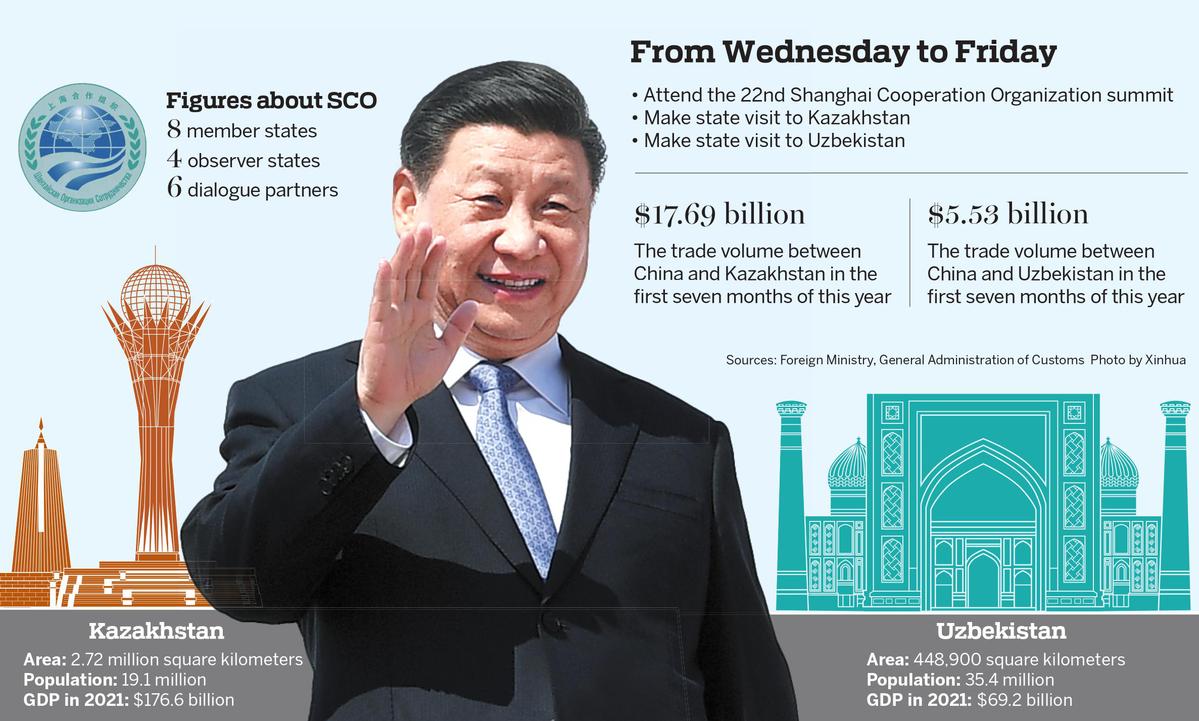Xi's Central Asia trip set to boost unity

[Photo/Xinhua]
President Xi Jinping's upcoming Central Asia trip will give a major boost to China's bonds with its neighbors there, catalyze two-way, pragmatic cooperation and promote the unity and efficacy of the 21-year-old Shanghai Cooperation Organization, observers said.
From Wednesday to Friday, Xi will attend the 22nd meeting of the Shanghai Cooperation Organization Council of Heads of State in Samarkand, Uzbekistan, and make state visits to Kazakhstan and Uzbekistan, Foreign Ministry spokeswoman Hua Chunying announced on Monday.
The Central Asia tour will be Xi's first trip abroad in more than two years, and the timing of the visits to the two destinations bears profound significance, experts said.
Both Kazakhstan and Uzbekistan are celebrating their 30th anniversary this year of building diplomatic relations with China, and their presidents visited China in February to attend the opening ceremony of the Beijing Olympic Winter Games and met with Xi.
Kazakhstan is the birthplace of the landmark Belt and Road Initiative, as it was there that Xi first proposed the Silk Road Economic Belt initiative — a key component of the BRI — during his first state visit to the country as president in 2013.
As of July 4, 149 countries and 32 international organizations have signed cooperative documents with China on jointly building the Belt and Road.
As Kazakhstan is on the first stop of the BRI's westward routes from China, "China-Kazakhstan relations have yielded fruitful outcomes in areas such as connectivity, production capacity, economy, trade and culture", said Chinese Ambassador to Kazakhstan Zhang Xiao.
Annual bilateral trade reached $25.25 billion last year, nearly 70 times the amount in 1992, the year in which the two countries established diplomatic ties, making the country "a vanguard and exemplary zone in co-building the Belt and Road", Zhang told China National Radio recently.
The two countries' trade volume reached $17.69 billion in the first seven months of the year, according to China's General Administration of Customs.
Meanwhile, China is working closely with Uzbekistan to boost the synergy between the BRI and the Development Strategy for New Uzbekistan, the country's flagship vision for growth.
Both countries are working toward the goal of reaching $10 billion in annual bilateral trade, according to Chinese Ambassador to Uzbekistan Jiang Yan.
The trade volume between the two nations was $5.53 billion in the first seven months of 2022, according to Customs data.
Su Xiaohui, deputy director of the China Institute of International Studies' Department of American Studies, said the trip "will further build on the great relationships between the top leaders and chart the course for more highlights of bilateral collaboration in the years to come".
"Also, the trip is expected to see China and the rest of the SCO member states gear up in tackling the unprecedented economic and political challenges from the outside world, given the spillover effects of the global economic downturn, geopolitical conflicts and the COVID-19 pandemic," Su said.
Samarkand, an Uzbek city known for its great cultural heritage, will host the SCO Summit on Thursday and Friday.
This year marks the 20th anniversary of the signing of the Charter of the Shanghai Cooperation Organization and the 15th anniversary of the signing of the Treaty on Long-Term Good-Neighborliness, Friendship and Cooperation.
The organization has eight member states, four observer states and six dialogue partners, and around 10 countries have voiced their hope to join the group or upgrade their status within the group.
"Instability and uncertainties are increasingly evident now", given the significant global changes unseen in a century, the COVID-19 pandemic and the resurfacing of a Cold War mentality in the world, Ambassador Jiang said recently in an interview with Chinese media.
Uzbek President Shavkat Mirziyoyev wrote in a signed article that "no country alone can hope to avoid or cope with these global risks and challenges".
"In a world with the new challenges and opportunities, the SCO has excellent prospects for transformation and growth, not only through quantitative replenishment, but also through the opening of new strategic vectors. These are transport and connectivity, energy, food and environmental security, innovations, digital transformation and green economy," he added.
Photos
Related Stories
- Xi's upcoming Central Asia trip to bolster SCO cooperation
- The SCO Samarkand Summit: Dialogue and Cooperation in an Interconnected World
- Visit to Central Asian countries boosts stability, cooperation: Chinese FM
- Growing cohesion of SCO, attraction of Shanghai Spirit highlighted amid Russia-Ukraine conflict and US-led bloc confrontation
Copyright © 2022 People's Daily Online. All Rights Reserved.









